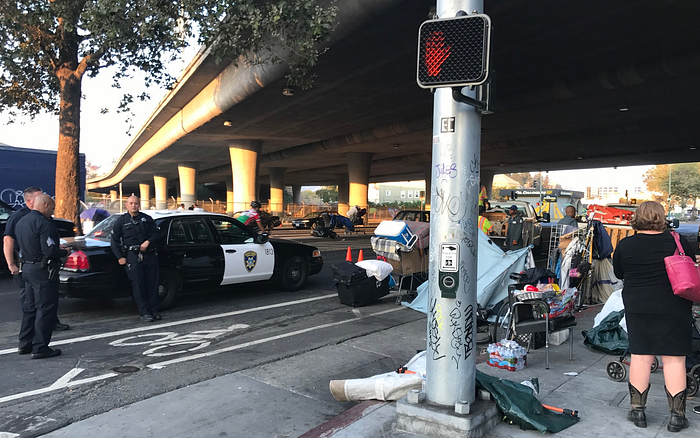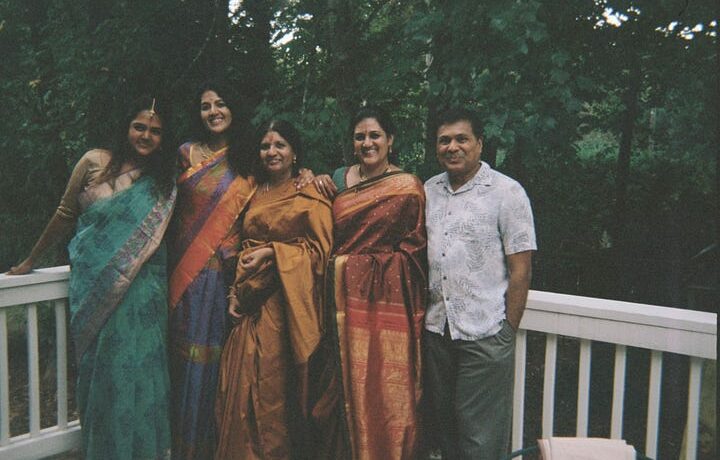I open my door and two metal gates and begin the walk to my shuttle stop. One block passes. When I get to 23rd and Telegraph, I look behind me and see an overpass, with tents underneath, uneven roads, cars speeding by carelessly- there aren’t crosswalks here. I continue my walk, another block passes. I see hip bars, pastry shops, bike lanes, art galleries. I live on the highly conflicting borderlands of gentrification —
When I first embarked on my post-grad career in the Bay Area, I was filled with excitement. The Bay area held the tech jobs my engineering peers at Georgia Tech gawked at on Glassdoor; I couldn’t fathom the prospects. Though I had lived briefly in other places, I had always called Atlanta, Georgia my home. I loved Atlanta, and this was the first time I was moving with an objective to call a new place, “home.” I moved into a beautiful three bedroom, two bath house with my best friend in Oakland. We were blocks away from BART, delicious cuisine, and my treasured YMCA. The rent was beyond reasonable for the Bay. I had found my ‘home’.
I was consulting for a Silicon Valley giant, taking a free shuttle south every day. I had been so excited about the notion of commuting in a tech shuttle… perhaps I would fall in love with a fellow techie, we could joke about which language we code in, eat free lunches together…

Cue Oakland — A reality that unapologetically involves, confronts, & captivates you

My first day on the shuttle, I quickly realized this was not a space for ‘falling in love’, let alone interacting. Best described as the ‘black box’ of my day, the shuttle was dimly lit, and isolating. It shipped me to a distant place in Silicon Valley, taking care of every need I could possibly have on a commute, from internet for work to a foot rest for naps, allowing me to ignore the three hours a day I was spending on the bus.
Meanwhile, a few streets from my home, the Oakland Police Department evacuated an encampment residing on a main street in Oakland. These people were forced to leave their homes and seek refuge a few streets away, incidentally across from our home.

This encampment continued to grow as the city increasingly displaced the nearby houseless. In trying to familiarize myself with the constant flux of faces and characters, I began to notice the disturbing number of people who seemed to have recently become unhoused.

I pushed myself out of my comfort zone and dedicated effort to unlearning the many stigmas I carried. I understood that I’m not a better human, just a larger beneficiary of a sick system. I saw the pain of being ignored by society as a fixture of a landscape. I learned the futility in building a better life when one’s circumstances barely allow for survival. I realized that although they may not have houses, they do have homes. Our neighbors coached me on using my privilege as a housed person to support our unhoused neighbors — from providing basic supplies to better acknowledging the space we shared and were equally entitled to.
The power in staying proximate to problems: Catalyzing Action
Many tech companies, in a refreshing deviation from the manufacturing firms I was accustomed to, tote a strong vocabulary around ‘changing the world’ and have the adoption rate and volume of users to seemingly do so. However, I found that the high salaries and extravagant campuses feed employees with an entitlement, absolving them from a relationship with the very real poverty gap generated with their contribution. Best represented by the opaque windows on the tech shuttles- employees can safely look out from a distance, if they so desire, but no one has access in.

The daily juxtaposition of a living space that is visibly impacted by the tech industry’s rapid growth and a work environment that shields the individual from responsibility created a sense of urgency in me and propelled me to find a more meaningful career…
Changing my career helped me stay hopeful
I am fortunate to have found a position at the Kapor Center directly impacting the problems I see in tech. I am grateful to have peers who constantly inspire and challenge me with thoughtful conversation and execution. Where I previously felt futility, I see opportunity for action in diversifying positions of power, especially within the tech industry. Diversity can introduce critical thinking to tech problem solving and empower companies to utilize their influence to improve economic opportunity and, really, the world for everyone. I program manage the Oakland Innovation Lab, where we bring together startups, non-profits, community organizations, and public organizations to create a space for collaboration and growth oriented around Oakland. This innovative position allows me to increase equity in Oakland, by providing resources to organizations which may not have access otherwise.

The privilege in my mobility
Since beginning this position, I have moved out of my first home in Oakland after two years to a more gentrified area of Oakland. To be very honest, I have found an unsettling serenity in not feeling immediately concerned with the well-being of my unhoused neighbors, wondering if the woman I see by herself will be safe tonight, hoping the toys I see do not belong to a child. The serenity is shallow: my privilege does not escape me for a moment, I have the ability to simply move away from that street and its problems;
I can look away.
To the Silicon Valley barista who made my foamy free lattes — who was born and raised in Mountain View and pushed out to San Jose, who drives a 45 minute shuttle-less, wifi-less commute back to her own hometown for work every morning, who serves everyone with a smile: I see you & I’m working for you.

